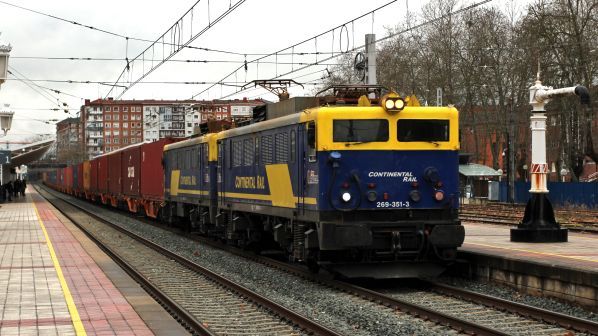SPAIN’s Ministry of Transport, Mobility and Urban Affairs (Mitma) has announced plans to spend €1.5bn through the European Union’s Recovery, Transformation and Resilience Plan to improve freight movements in the country, with a major focus on shifting freight from road to rail.
The improvements will contribute to Spain’s Freight 30 Initiative, which aims to increase rail’s market share from 4% of net tonne-km to 10% by 2030.
“It is an ambitious goal, but I think it is realistic,” says Spain’s general secretary of infrastructure, Mr Sergio Vázquez Torrón. “There have been attempts in the past, but now is the time to make it happen. We have the opportunity, the capacity, and the obligation to overcome this situation. It is now or never.”
Around €1bn will be allocated to improve efficiency in the freight distribution network through the development of multi-modal systems and the modernisation of distribution centres, with an emphasis on the railway network. This includes €222m to develop four rail freight terminals in Vicálvaro, Madrid; La Llagosta, Barcelona; Fuente de San Luis, Valencia; and Júndiz, Álava. Another €403m will improve intermodality at ports, with the construction and improvement of rail links with the wider network, including major European corridors. Road access will also be improved through a €43m investment.
More than €500m will be provided for programmes to promote sustainable and digital transport, including €365m for rail. This includes improving interoperability through the installation of ERTMS, and the purchase of dual voltage and variable gauge rolling stock; improving intermodality by creating sidings and road-rail terminals; supporting sustainable freight transport with eco-incentives; and modernising the network.
The safety of road transport will be improved through enhanced roadside parking for heavy freight lorries, and better refuelling facilities for alternative fuels.
“We want to continue to grow, but we must do so in a more efficient way and above all in a way that is more respectful of our climate goals,” Torrón said during the Transport, Mobility and Logistics Business conference organised by elEconomista. “The commitment of this ministry to dialogue and close cooperation with companies in the sector is total.”
Vázquez added that the sector must look to provide sustainable and effective solutions for first and last mile transport.
“Interoperability, sustainability and transparency are essential: an efficient logistics chain needs to know what, how, when, where and by whom... at all times. In this way, it will be more agile, more reliable, more integrated and more competitive.”
Spain has already seen a rebound in freight traffic to pre-pandemic levels, especially on the road. “The data we have indicates that we are heading towards levels of internal mobility by land transport similar to those of 2019, in some cases even higher,” Vázquez says.

